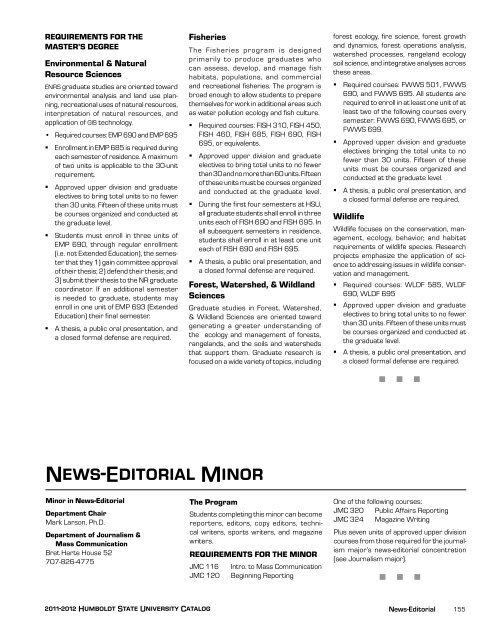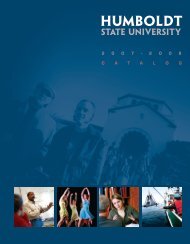2011-12 Academic Year - Bad Request - Humboldt State University
2011-12 Academic Year - Bad Request - Humboldt State University
2011-12 Academic Year - Bad Request - Humboldt State University
Create successful ePaper yourself
Turn your PDF publications into a flip-book with our unique Google optimized e-Paper software.
REQUIREMENTS FOR THE<br />
MASTER’S DEGREE<br />
Environmental & Natural<br />
Resource Sciences<br />
ENRS graduate studies are oriented toward<br />
environmental analysis and land use planning,<br />
recreational uses of natural resources,<br />
interpretation of natural resources, and<br />
application of GIS technology.<br />
• Required courses: EMP 690 and EMP 695<br />
Enrollment in EMP 685 is required during<br />
each semester of residence. A maximum<br />
of two units is applicable to the 30-unit<br />
requirement.<br />
Approved upper division and graduate<br />
electives to bring total units to no fewer<br />
than 30 units. Fifteen of these units must<br />
be courses organized and conducted at<br />
the graduate level.<br />
Students must enroll in three units of<br />
EMP 690, through regular enrollment<br />
(i.e. not Extended Education), the semester<br />
that they 1) gain committee approval<br />
of their thesis; 2) defend their thesis; and<br />
3) submit their thesis to the NR graduate<br />
coordinator. If an additional semester<br />
is needed to graduate, students may<br />
enroll in one unit of EMP 693 (Extended<br />
Education) their final semester.<br />
A thesis, a public oral presentation, and<br />
a closed formal defense are required.<br />
Fisheries<br />
The Fisheries program is designed<br />
primarily to produce graduates who<br />
can assess, develop, and manage fish<br />
habitats, populations, and commercial<br />
and recreational fisheries. The program is<br />
broad enough to allow students to prepare<br />
themselves for work in additional areas such<br />
as water pollution ecology and fish culture.<br />
Required courses: FISH 310, FISH 450,<br />
FISH 460, FISH 685, FISH 690, FISH<br />
695, or equivalents.<br />
Approved upper division and graduate<br />
electives to bring total units to no fewer<br />
than 30 and no more than 60 units. Fifteen<br />
of these units must be courses organized<br />
and conducted at the graduate level.<br />
During the first four semesters at HSU,<br />
all graduate students shall enroll in three<br />
units each of FISH 690 and FISH 695. In<br />
all subsequent semesters in residence,<br />
students shall enroll in at least one unit<br />
each of FISH 690 and FISH 695.<br />
A thesis, a public oral presentation, and<br />
a closed formal defense are required.<br />
Forest, Watershed, & Wildland<br />
Sciences<br />
Graduate studies in Forest, Watershed,<br />
& Wildland Sciences are oriented toward<br />
generating a greater understanding of<br />
the ecology and management of forests,<br />
rangelands, and the soils and watersheds<br />
that support them. Graduate research is<br />
focused on a wide variety of topics, including<br />
News-Editorial Minor<br />
Minor in News-Editorial<br />
Department Chair<br />
Mark Larson, Ph.D.<br />
Department of Journalism &<br />
Mass Communication<br />
Bret Harte House 52<br />
707-826-4775<br />
The Program<br />
Students completing this minor can become<br />
reporters, editors, copy editors, technical<br />
writers, sports writers, and magazine<br />
writers.<br />
REQUIREMENTS FOR THE MINOR<br />
JMC 116 Intro. to Mass Communication<br />
JMC <strong>12</strong>0 Beginning Reporting<br />
forest ecology, fire science, forest growth<br />
and dynamics, forest operations analysis,<br />
watershed processes, rangeland ecology<br />
soil science, and integrative analyses across<br />
these areas.<br />
Required courses: FWWS 501, FWWS<br />
690, and FWWS 695. All students are<br />
required to enroll in at least one unit of at<br />
least two of the following courses every<br />
semester: FWWS 690, FWWS 695, or<br />
FWWS 699.<br />
Approved upper division and graduate<br />
electives bringing the total units to no<br />
fewer than 30 units. Fifteen of these<br />
units must be courses organized and<br />
conducted at the graduate level.<br />
A thesis, a public oral presentation, and<br />
a closed formal defense are required.<br />
Wildlife<br />
Wildlife focuses on the conservation, management,<br />
ecology, behavior, and habitat<br />
requirements of wildlife species. Research<br />
projects emphasize the application of science<br />
to addressing issues in wildlife conservation<br />
and management.<br />
Required courses: WLDF 585, WLDF<br />
690, WLDF 695<br />
Approved upper division and graduate<br />
electives to bring total units to no fewer<br />
than 30 units. Fifteen of these units must<br />
be courses organized and conducted at<br />
the graduate level.<br />
A thesis, a public oral presentation, and<br />
a closed formal defense are required.<br />
n n n<br />
One of the following courses:<br />
JMC 320 Public Affairs Reporting<br />
JMC 324 Magazine Writing<br />
Plus seven units of approved upper divi sion<br />
courses from those required for the journalism<br />
major’s news-editorial concentration<br />
(see Journalism major).<br />
n n n<br />
<strong>2011</strong>-20<strong>12</strong> <strong>Humboldt</strong> <strong>State</strong> <strong>University</strong> Catalog News-Editorial<br />
155

















